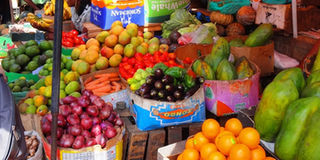World food future depends on Africa

With more than 800 million people worldwide suffering from hunger and more than two billion affected by malnutrition, food insecurity remains a real threat to global development. FILE PHOTO
Addressing a standing room only crowd of global agriculture experts at the FAO headquarters in Rome, 2017 World Food Prize Laureate and President of the African Development Bank, Akinwumi Adesina, says he believes that Africa does not need aid but disciplined investments.
According to this grandson of a subsistence farmer, he says the time has come to view investment and development opportunities in Africa through a totally different lens. With more than 800 million people worldwide suffering from hunger and more than two billion affected by malnutrition, food insecurity remains a real threat to global development.
Adesina is making a global pitch for renewed visionary leadership and strategic alliances, “the future of food in the world will depend on what Africa does with agriculture.” The African Development Bank, which he leads, envisions a food secure continent, which uses advanced technologies, creatively adapts to climate change, and develops a whole new generation of what he describes as ‘agripreneurs’ – empowered youth and women who he expects to take agriculture to the next level.
By 2050, an additional 38 million African will be hungry. The paradox of lack in the midst of plenty, and Africa’s growing youth bulge are some of the reasons why Adesina’s sense of urgency is resonating with numerous government, private sector, and multilateral leaders during recent European and Asian trips. The banker and 2017 World Food Prize Laureate will be the first to admit that he considers himself the ‘evangelist-in-chief’ for a food secure Africa.
Africa continues to import what it should be producing, spending $35b on food imports each year, a figure that is expected to rise to $110b in 2025 if present trends continue. A few days later, Adesina joined Rockefeller Foundation president Raj Shah, Unilever CEO Paul Polman, and 2018 World Food Prize nominees Lawrence Haddad and David Navarro, among other prominent global academic, development, and agriculture experts at Wageningen University and Research, in the Netherlands, to make the case for urgent collective action by State and non-State players to accelerate Africa’s agricultural growth and transformation.
Africa receives only 2 percent of the $100 billion annual revenues from chocolates globally. Adesina tells his audience that “adding value to what nations produce, is the secret to their wealth. Producing chocolate instead of simply exporting cocoa beans does not require rocket science.”
To expand opportunities for youth, women, and private sector players, Adesina is on a global mission to promote and seek support for the bank’s Affirmative Finance for Women in Africa (AFAWA) programme, which aims to mobilise $3b to support women entrepreneurs, who historically lack access to finance, land, and land titles; a $300m to enable youth programme to develop the next generation of agribusiness and commercial farmers for Africa.
Alkassoum Diallo,
[email protected]




